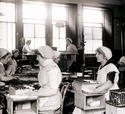 Glasgow had become a major centre of food manufacture and tobacco processing, both relatively little affected by the depression of the period which hit heavy industry. Baking and confections became important trades. The baking of bread in small shops and selling from street carts had been replaced by factory production. Major firms, such as Bilsland Brothers, Beattie, and Montgomerie Bread, pioneered wrapped bread for sale through grocers and other shops and Glasgow-baked bread had widespread distribution beyond the city by road and rail.
Glasgow had become a major centre of food manufacture and tobacco processing, both relatively little affected by the depression of the period which hit heavy industry. Baking and confections became important trades. The baking of bread in small shops and selling from street carts had been replaced by factory production. Major firms, such as Bilsland Brothers, Beattie, and Montgomerie Bread, pioneered wrapped bread for sale through grocers and other shops and Glasgow-baked bread had widespread distribution beyond the city by road and rail.
 Other bakers turned to making cakes, scones and biscuits and in some cases opened tea-rooms that became a feature of the period. By the 1930s City Bakeries had more than sixty branches and, besides Lyons, was the largest retail baker in Britain. Several large and famous biscuit firms expanded rapidly in the inter-war period. These included Macfarlane Lang, Gray Dunn, and just beyond the city in Rutherglen, the firms of Nairn and Paterson.
Other bakers turned to making cakes, scones and biscuits and in some cases opened tea-rooms that became a feature of the period. By the 1930s City Bakeries had more than sixty branches and, besides Lyons, was the largest retail baker in Britain. Several large and famous biscuit firms expanded rapidly in the inter-war period. These included Macfarlane Lang, Gray Dunn, and just beyond the city in Rutherglen, the firms of Nairn and Paterson.
 Glasgow's reputation for cakes and biscuits was also matched by some famous proprietary foods, for example, Marshall's "Farola" (and later macaroni and other pasta products), and Paterson's "Camp Coffee" (the most popular coffee essence of the time, widely exported). The traditional Scottish sweet tooth was catered for by several large firms, most prominent being R S McColl and Birrell Ltd, while mineral waters and lemonade were made by Barr (famed even then for its Irn Bru), Dunn and others.
Glasgow's reputation for cakes and biscuits was also matched by some famous proprietary foods, for example, Marshall's "Farola" (and later macaroni and other pasta products), and Paterson's "Camp Coffee" (the most popular coffee essence of the time, widely exported). The traditional Scottish sweet tooth was catered for by several large firms, most prominent being R S McColl and Birrell Ltd, while mineral waters and lemonade were made by Barr (famed even then for its Irn Bru), Dunn and others.
 Tobacco also expanded as a large-scale factory industry, notably so in the case of Stephen Mitchell who after 1901 became a major player in the Imperial Tobacco Co, formed to fight American competition. This firm, and the SCWS (Scottish Co-operative Wholesale Society) also with a large plant in Glasgow, were among the leading producers of cigarettes in Britain from the 1930s to 1950s.
Tobacco also expanded as a large-scale factory industry, notably so in the case of Stephen Mitchell who after 1901 became a major player in the Imperial Tobacco Co, formed to fight American competition. This firm, and the SCWS (Scottish Co-operative Wholesale Society) also with a large plant in Glasgow, were among the leading producers of cigarettes in Britain from the 1930s to 1950s.